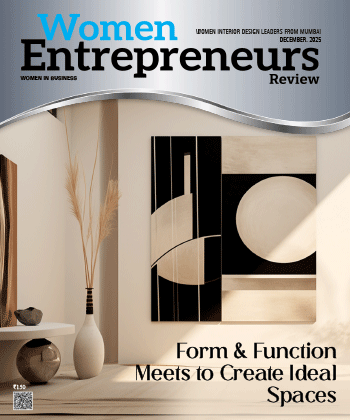
Addressing Women Underrepresentation in Start-up Ecosystem- there's light at the end of the tunnel
By: Archana Khosla Burman, Founder Partner, Vertices Partners
Archana Khosla Burman is the Founder Partner, Vertices Partners, Senior vice Chairperson, FICCI FLO Mumbai and the National Head of Programming and Content - Startup Cell at FICCI FLO. Archana sits on the advisory board of several start-ups and new-age entrepreneurial ventures. She is also a member of the POSH committees of several companies and vociferously supports gender diversity and fair treatment. Apart from managing her entrepreneurial venture, Archana is also involved in the process of creating a platform for women entrepreneurs and investors for seamless participation in the development of women empowerment. She can speak about challenges she faced as an entrepreneur, the future of work for women in a post-COVID world, her advice to mompreneurs who are just at the beginning of their journey, the startup ecosystem, etc.
The underrepresentation of women founders and investors in the Indian startup ecosystem is symptomatic of gender stereotyping and unconscious bias against women in general. These deep-seated unconscious biases are a lot trickier to address.
When we talk about women taking up leadership roles in the workforce, we are still dealing with and operating within the larger context of systematically perpetuated gender discrimination manifested over generations. We deal with prejudices not just in the underprivileged or the underdeveloped sections of society but even amongst the most educated of groups.
In an interview, media mogul Oprah Winfrey observed that gender roles become even more pronounced the higher up the ladder we go. In the face of this gargantuan, age-old, systemic epidemic of gender disparity, we need all hands on deck. With my work, and through some of my friends and amazing leaders I have gotten to know, we are actively working towards initiatives that promote mentorship for women in leadership roles, actively seek to create women investors, train and develop entrepreneurs right from the grassroots to higher up and take up positions in companies’ boards.
Bearing in mind the changing social fabric where men are not necessarily the breadwinners and marriage is becoming a choice rather than a given, the economic fabric needs to adapt, and fast. A recent statistic sadly indicates that more and more women are now retiring into poverty. Needless to say that actively increasing women in C-suites and up, will improve the chances for the country’s economy to achieve it’s true and real potential. Otherwise, we may be staring down the barrel of more social problems, especially for senior citizens.
The consensus of creating a women-friendly work culture has grown tremendously in all industries and at all levels. POSH at work is a great example of this. Period Leaves in another example. Spain became the first European country to recognize the necessity of menstrual leave. The need to raise the standards of the norm is critical to affecting change in large numbers. Much more needs to be done, including creating workspaces that are friendly for lactating mothers, work flexibility and opportunities for women coming back into the workforce, and organizations’ changing attitudes towards the temporary and part-time workforce. On the whole, modern times paint an optimistic picture.
Only now, as more and more women are becoming the decision makers in VC funds and beyond, and on the other hand, more and more men are waking up to the realities of gender bias and how it may manifest in the day–to–day unquestioned and unexamined attitudes, rather they are going a step beyond and getting included in conversations geared towards moving the milestones in women empowerment, we are witnessing a change. In the year of India's G20 presidency, India’s G20 Nari Shakti Model is setting the stage for women-led growth. Does change have the scope to be accelerated? Absolutely. Nonetheless, change is afoot.
Most Viewed
- 1 Women's Health Startup HerMD Closing Doors Amid Industry Challenges
- 2 5 Famous Women in Indian Armed Forces
- 3 Saudi Women No longer Require Male Permission for Clothing Choices, says Prince MbS
- 4 Kolkata Medtech Startup Innovodigm Raises Rs 5.5 Crore Seed Funding Led by IAN Group
- 5 Yamunanagar's Kashish Kalra Honoured after Securing 111th Rank in UPSC Civil Services Exam
- 6 Madurai Appoints Its First Woman Corporation Head
- 7 IAS Vijayalakshmi Bidari Appointed as the new Nagpur Divisional Commissioner
- 8 American Entrepreneur Lucy Guo Overtakes T Swift to become Youngest Female Billionaire
- 9 ICC Women's World Cup 2025 Trophy Showcased at Indore's Holkar Stadium
- 10 Aparna Saxena's Beauty Venture AntiNorm Launches in India
- 11 Vidya Nataraj Co-Founded BlueStone Jewellery & Lifestyle files IPO
- 12 5 Women Freedom Fighters of India
- 13 Dr. G Krishnapriya appointed as CEO for Trichy
- 14 M3M & Sirona Partner to Introduce Menstrual Hygiene Vending Machines in 15 Locations
- 15 Punjab Govt launches SHE Cohort 3.0 Supporting Tech-led Women Startups
- 16 Indian origin Lawyer, Sweena Pannu appointed as the US New Superior Court Judge
- 17 The Aurora Tech Award recognizes 4 Indian Women-led Startups
- 18 Kerala's Republic Day parade featured an all-female tableau
- 19 Manisha Kabbur Becomes Karnataka's First Woman International Karate Coach
- 20 Director K. S. Ravikumar's Daughter Maalica Ravikumar Launches Life Coaching Company 'Evergrowth Academy' for Women
- 21 Leezu's Raises Pre-Seed Funding to Accelerate Growth in Sexual Wellness Industry
- 22 Sattu: Super-easy summer drink for PCOS gut healing
- 23 Swathi Nelabhatla creates Sitha App, India's First Women-Exclusive Gig Platform
- 24 7 Timeless Female Kathak Dancers & their Iconic Legacies
- 25 Meet 7 Iconic Women Architects of Modern India & their Most Impactful Work
- 26 This Woman-led Insuretech Startup is Helping Bridge the Education Financing Gap in India
- 27 Women Leaders Share Lessons Learnt from India Women's WC Win
- 28 5 Enterprising Women Founders Powering Singapore's Tech & Innovation Landscape
- 29 4 Women. 4 Stories. One Vision for Smarter, Stronger Healthcare
- 30 Global Gender Gap Narrows to 68.8%, But Full Equality 123 Years Away: WEF Report 2025
- 31 Changemakers: 7 Women Entrepreneurs Taking the Make in India Movement Forward
- 32 Meet Lucy Guo, The Youngest Self-Made Female Billionaire Disrupting Tech
- 33 How Women are Driving India's Festive Online Shopping Surge






